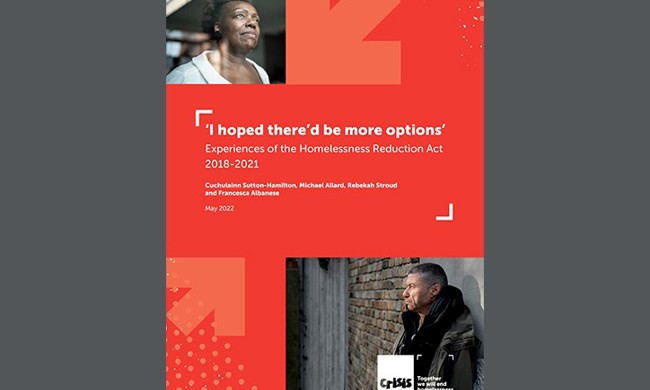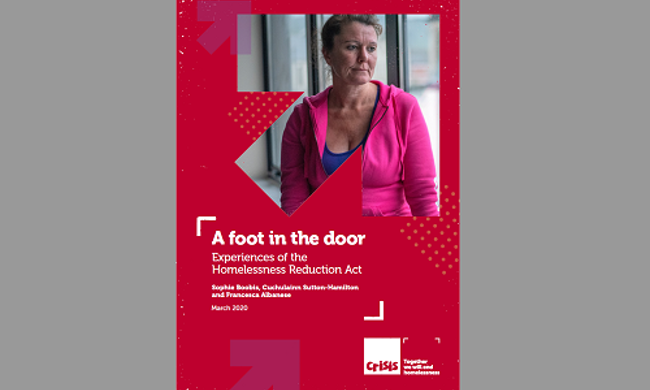“I hoped there’d be more options:” Experiences of the Homelessness Reduction Act, 2018-2021
30.05.2022
In 2018 the Homelessness Reduction Act (HRA) introduced huge changes to the English homelessness system, following on from campaigning work by Crisis and others. More people became eligible to receive support with homelessness from their council, and local authorities were required to change their services to focus more on preventing homelessness and making sure support is personalised to people’s needs.
Between 2018-2021, Crisis carried out a piece of longitudinal research, funded by Oak Foundation, exploring people’s experiences of these changes. We spoke to around 1,500 people facing homelessness as well as staff in six Housing Options services to explore how effective the act has been.
You can sign up to a launch event about the research, taking place on 13 June.
Key findings
Experiences of accessing help:
- Whilst the HRA has opened up support and assistance for significantly more people facing homelessness, many are still being turned away under the new system and not getting the help they need. Overall, one in six (17%) of people across the second and third waves of our survey said they received no support, advice or assessment at all from Housing Options.
- Most people felt treated with respect when they made initial contact (78%), and felt staff listened sensitively and with respect during assessments (73%). But many people found it difficult to get in touch with Housing Options, with over 4 in 10 feeling it was hard to reach their housing officer and over half saying their housing officer was not available to speak when they needed them.
- Issues with lack of housing options, and not having enough staff or funding for their service, meant that many staff felt it was challenging to deliver support under the HRA. This meant that delivery of tools such as Personalised Housing Plans and assessments was very mixed.
- Whilst the HRA was intended to change Housing Options culture to become more supportive and reduce gatekeeping practices, services were often more focused on deciding whether people were eligible for support over actually providing support. The pandemic widened support for a limited period of time especially for people rough sleeping.
- Findings from the research and official statistics show that when more emphasis is placed on prevention, people’s outcomes improve. However, there were missed opportunities to keep people in stable accommodation and strain on services meant people did not have their homelessness prevented at the earliest possible point.
- The HRA introduced a Duty to Refer to widen the responsibility of identifying people at risk of homelessness across other public bodies. Positively, as our study went on, this led to more people approaching for help following advice from another organisation (59% in wave 3 compared to 39% in wave 1).
Experiences of accessing housing
- Among those whose contact with Housing Options had ended, nearly half (46%) remained homeless after going to the local authority for support. This figure was higher for people with multiple/complex support needs (57%) and those who were sleeping rough when they approached Housing Options (67%). Both of these groups more generally had the worst experiences under the HRA.
- Accommodation outcomes have improved over the study - over half (56%) either remained in accommodation or their living situation improved after going to Housing Options (increasing from 51% to 67% over three years)
- But for many respondents (including those whose situation has improved) their housing outcome was not a satisfactory one. Half did not think it was secure for at least 6 months, and more than half (58%) did not think it was suitable for their needs. The reasons for this included homelessness not being resolved, accommodation being temporary, but also issues with more permanent forms of accommodation, such as affordability, poor quality living conditions, accommodation being inappropriate for support needs, and a lack of follow-up from Housing Options or other services after moving in.
- Families gave the most negative account of their housing situation after using Housing Options, with only 22% feeling their living situation afterwards was secure for 6 months and suitable.
Based on the research, recommendations include: building on the intent of the HRA and widening legal protections to help everyone address their homelessness; increasing the supply of social rented housing; and improving service standards through introducing a statutory code of practice.
Reference
Sutton-Hamilton, C., Allard, M., Stroud, R., and Albanese, F. (2022) “I hoped there’d be more options:” Experiences of the Homelessness Reduction Act, 2018-2021. London: Crisis.


